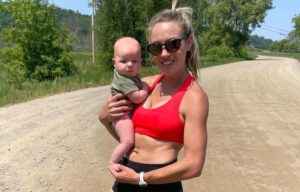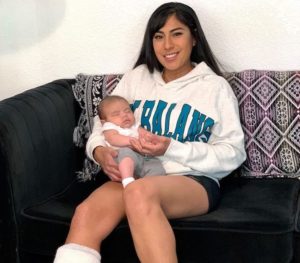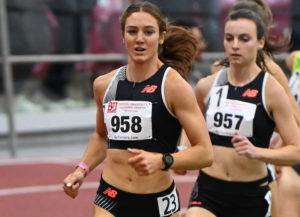
Last Monday, led by a 1–3 finish from Mercy Chelangat and Amaris Tyynismaa, the University of Alabama finished eighth at the pandemic-delayed 2020 NCAA Cross Country Championships in Stillwater, Oklahoma. It was the first time the Alabama women had made a team appearance at the event since 1994. They hadn’t had an All-American in cross country since Jessica Fry in 1995. This year they had three: Chelangat, Tyynismaa, and Esther Gitahi, who finished 36th.
It was quite the turnaround for a team that hadn’t qualified a single runner the last time the meet was held, 16 months earlier. (Chelangat missed qualifying by one spot.) A variety of factors have gone into the team’s rise, but it would be easy to overlook the contributions of the team’s volunteer assistant coach, professional runner Samantha Palmer.
Palmer, 29, moved to Alabama when her husband, Will Palmer, was hired to coach the distance runners in the summer of 2018. Now she balances professional running with high-level coaching, things that don’t always go hand-in-hand.
A two-coach family
Until the summer of 2018, when they got married, Samantha and Will Palmer had lived separately for the entirety of their relationship. That’s how things sometimes work out when there are two cross country and track & field coaches in the family. Before going to Alabama, Samantha was coaching at the University of Toledo, and Will was coaching at Georgetown. When they got engaged in 2017, they agreed that they would look for jobs that would allow them to live in the same city after getting married. They considered options that would allow them to both be paid coaches as well as the scenario they ended up with, where Will is the paid coach, and Samantha volunteers for the team, while having more time and energy to put into her professional running career.
“Honestly, I love my role,” Palmer said. “I love being kind of behind the scenes and not in the spotlight. Where I am in my running, it suits me well and it’s exactly what I need. Sometimes people ask if I’m upset I’m not getting any recognition for how well the women are doing. Will knows that I’m a big piece of it, and the girls know, and that’s really all that matters. I don’t need to broadcast it to the world.”
Palmer knows at some point the pendulum will shift and she’ll want to take on a larger coaching role, but for now, she’s content to also focus on giving running her best shot.
A culture shift
When the Palmers arrived in Tuscaloosa in the summer of 2018, they inherited a talented team with untapped potential. They agreed that they’d work on establishing a positive team culture first and make performance secondary. Sometimes that meant skipping an afternoon practice and doing a team bonding activity instead. From a performance standpoint, it might not have seemed like the most logical choice, but they were addressing a sometimes overlooked but important element of creating a successful team. “They needed to find their own identity as a group,” Palmer said.
Palmer also makes sure to speak openly and honestly with the women she coaches about physical and mental health. “I had teammates in college who really struggled with fueling, and I felt like it was ignored a lot of the time, especially if they were running really well,” she said. “And for me personally, I never want to be known as that coach.”
She emphasizes balance and takes a long-term view. “At the end of the day, it’s not just my job to help these women run fast,” she said. “They’re student-athletes. They need to eventually go out and get a job in the professional world one day. I need to help them also become the best version of themselves. I want them to run fast because I know they have big goals, but I also want them to be healthy people, and I want them to enjoy running 10 years down the road, when they don’t have to do it anymore.”
In the Palmers’ first season at Alabama, the team finished ninth out of 14 teams at the 2018 SEC Cross Country Championships. From there, the program saw steady progress, with athletes setting many personal bests on the track later that academic year, and Gitahi finishing third in the 5,000m at the 2019 NCAA Outdoor Track & Field Championships. “It became this domino effect of feeding off of the positive energy the group was creating,” Palmer said.
In the fall of 2019, the Alabama women moved up to fifth place at the SEC Cross Country Championships, and Palmer really began to see a shift during the 2020 indoor track season, before Covid shut it down.
By the time they got to last Monday’s NCAA Cross Country Championships, they knew they had a solid shot at having three All-Americans. But first up were the NCAA Indoor Track & Field Championships.
A DQ and a rebound
Though Chelangat and Tyynismaa ran fast enough to qualify for the NCAA Indoor Track & Field Championships as individuals, they opted to forgo their individual events to focus on team goals. Due to the pandemic, for the first time ever, the indoor meet and cross country championships would be held just days apart. Chelangat decided to solely focus on cross country, and Tyynismaa anchored the team’s distance medley relay and had two days to rest before competing in Monday’s cross country championship.
The distance medley relay squad knew they had a good shot at a strong showing because two weeks earlier, the quartet of Jami Reed, Christal Mosely, Lauren Turner, and Tyynismaa set a SEC championship and school record of 10:59.21. At the NCAA meet, they ran only 0.2 seconds slower and crossed the line fourth, with Tyynismaa running the fastest anchor leg of the night (4:31.11). They went out to cool down, pleased that they’d earned All-America honors, only to find out upon their return that they’d been disqualified for interfering with another team on one of the exchanges.
Will was in Fayetteville with the indoor runners, and Samantha flew to Stillwater with the cross country-only group. When Will and the runners who competed in Arkansas arrived in Oklahoma Saturday morning—both Reed and Tyynismaa would be doubling back from the DMR—Samantha could tell that they were a little down. “We told two of our girls it was their sole purpose to make sure the vibes were good, and honestly, they just had a ton of fun all weekend.”
The pandemic meant that there was no pre-meet banquet, one of the traditions of the NCAA Cross Country Championships, so the athletes dressed up and held their own. “They made sure that they made the most of their experience,” Palmer said. “I think that helped a ton because it took some of that disappointment away and they moved on to a new focus. They knew they were in Stillwater to accomplish something, and they had to have short-term memory.”
Heading into Monday’s race, the Palmers thought that Gitahi was fit enough to be an All-American (top 40), even if she didn’t quite have her very best day, and that’s Samantha’s assessment of how things ultimately played out, as Gitahi was 36th. Palmer figured that Chelangat could be in the top five, and that anyone in the top five had a shot at winning.
And they knew Tyynismaa had good track fitness, but it was harder to say how that would play out on a cross country course. At the SEC Cross Country Championships in the fall, Tyynismaa finished 26th, and was Alabama’s fifth runner to finish, but since the start of the indoor season, she had been running on a completely different level.
Chelangat was coming off a disappointing SEC Indoor meet two weeks earlier, where she was hoping for a win but finished third in the 5,000m and fourth in the 3,000m. But she knew there was nothing she could do to change the outcome, so she focused her attention on goals ahead. “She actually told one of her teammates after, ‘I’m just going to go win cross country,’” Palmer said.
But in their conversations with Chelangat heading into Monday’s race, the Alabama coaches didn’t talk about winning. They only talked about running her best race possible. In the end, both Chelangat and Tyynismaa surpassed any expectations Palmer had going in. “If you had told me a week ago that we’d go 1–3, I would have fallen out of my chair, but it was super fun to watch,” she said.
Balancing roles
When Palmer arrived at Alabama in 2018, she was coached remotely by Tony Houchin and while she did some of her recovery runs with the Alabama team, she did her hard training solo.
With the onset of the pandemic, things changed. Palmer was coming off a disappointing Olympic Marathon Trials race (she finished 33rd) and didn’t give herself enough down time after the race, which ultimately led to burnout. “I wanted this setup where I could put as much emphasis into my own running as I wanted to,” said Palmer. “Then all of the sudden, it was the first time where I just didn’t want to run. It kind of scared me a bit.” She took time off, which helped her regain her love of running and her desire to race.
She also decided to switch over to having Will coach her, because she missed in-person interactions with a coach and having someone who could adjust her training on the fly. During lockdown, she also missed being around people, so when she and Will were allowed to start working with the Alabama runners in person again in August, she started doing most of her training with the team.
Palmer finds that training with her team offers all kinds of insights she might not otherwise have. “You go on a run and it’s so much easier to talk about things,” she said. “You find that so and so broke up with her boyfriend or she had three midterms this week. That doesn’t come out in post-run chatter; that comes out while you’re running and you’re venting and you’re just talking to your friends.”
And though Palmer is a professional runner, training with the team’s top runners is no walk in the park. Any time she trains with Chelangat, Tyynismaa, or Gitahi, Palmer knows she’ll be challenged. “Mercy’s taken me to the hurt locker a few times,” Palmer said. “A few weeks ago, we negative split an 800 during a tough workout… It was probably one of the hardest workouts I’ve done with them, but it was way easier doing it with them rather than doing it by myself.”
Training with the team also gives Palmer the chance to show her team that she has bad days too, sometimes. “They’ve watched me have some pretty terrible days,” she said. “I’ve had a breakdown in the middle of the workout. It’s not that I want my athletes seeing me do that, but it kind of gives them permission to be vulnerable and really be honest with us about how they’re feeling.”
And experiencing the training for herself also helps Palmer write the training. The Palmers jointly plan the workouts, and while Samantha understands that every athlete reacts differently, she can offer additional insights because she’s experienced it for herself.
Balancing pro running and coaching isn’t always easy, especially when the racing schedules conflict. Palmer opted not to travel with the team indoors this winter, which allowed her to race a half marathon in Atlanta the weekend of the SEC Indoor Track & Field Championships. She had planned to race the USATF 15K Championships in Florida five days after the NCAA Cross Country Championships, but coming off an emotional weekend, she realized she needed rest more than a race, so she scratched from the event. “I made a promise to myself that I’d go to Stillwater and be 100 percent into coaching and what [the team] needed,” Palmer said. “I made my training an afterthought and just got it in when I could. Those things are super necessary if I’m going to try to wear a double hat sometimes.”
Instead she plans to run a half marathon next month in Omaha, Nebraska, where she hopes to break 70 minutes for the first time. Palmer is qualified for the Olympic Track & Field Trials in the 10,000m, and she plans to run it, but she’s most excited to run a to-be-determined fall marathon, even though those are particularly difficult to schedule around the cross country season. “At some points, I have to get a little selfish and make a race choice for myself, even if that means I’m going to miss something important with the team, but I try not to do that very often,” Palmer said.
Though she’s run a 2:29 marathon and 1:11 half marathon, she is unsponsored. “I can’t get a sponsorship and that’s totally fine,” she said. “That’s just the way the pro running world is right now. I’m not at the level of Molly Huddle and Molly Seidel and those women, but I still love it, and I have this burning passion.”
The Palmers see any income Samantha might make through prize money as a bonus, but they don’t rely on it. So not being able to earn income when races were canceled in 2020 was more of an emotional hit than a financial one. “I struggled with the idea that I’m taking all this time to run but I’m also not contributing anything to our family in any way. I know it’s not true, but it’s one of those demons you battle in your head,” Palmer said. “Sometimes I feel like I’m so tired at the end of every day, but I’m not actually getting anything financially.”
Despite her lack of financial compensation, Palmer is working hard and positively affecting many lives through her coaching and her running. In January, she started a women’s running group for all ages and abilities in Tuscaloosa, partly so she could meet more people in the local community. She coached the group through a 12-week training program, and this weekend, members of the group will race a local 5K or half marathon. The participants range in age from college students to women in their 60s, and Palmer has particularly enjoyed seeing the mentorship that has naturally occurred within the group. “They started doing little things outside of meeting as a running group, and that’s why I created it,” said Palmer. “We have a lot of women that are kind of in transition periods of their lives, and it’s been a lot of fun with them being able to talk to each other and learn from each other.”





